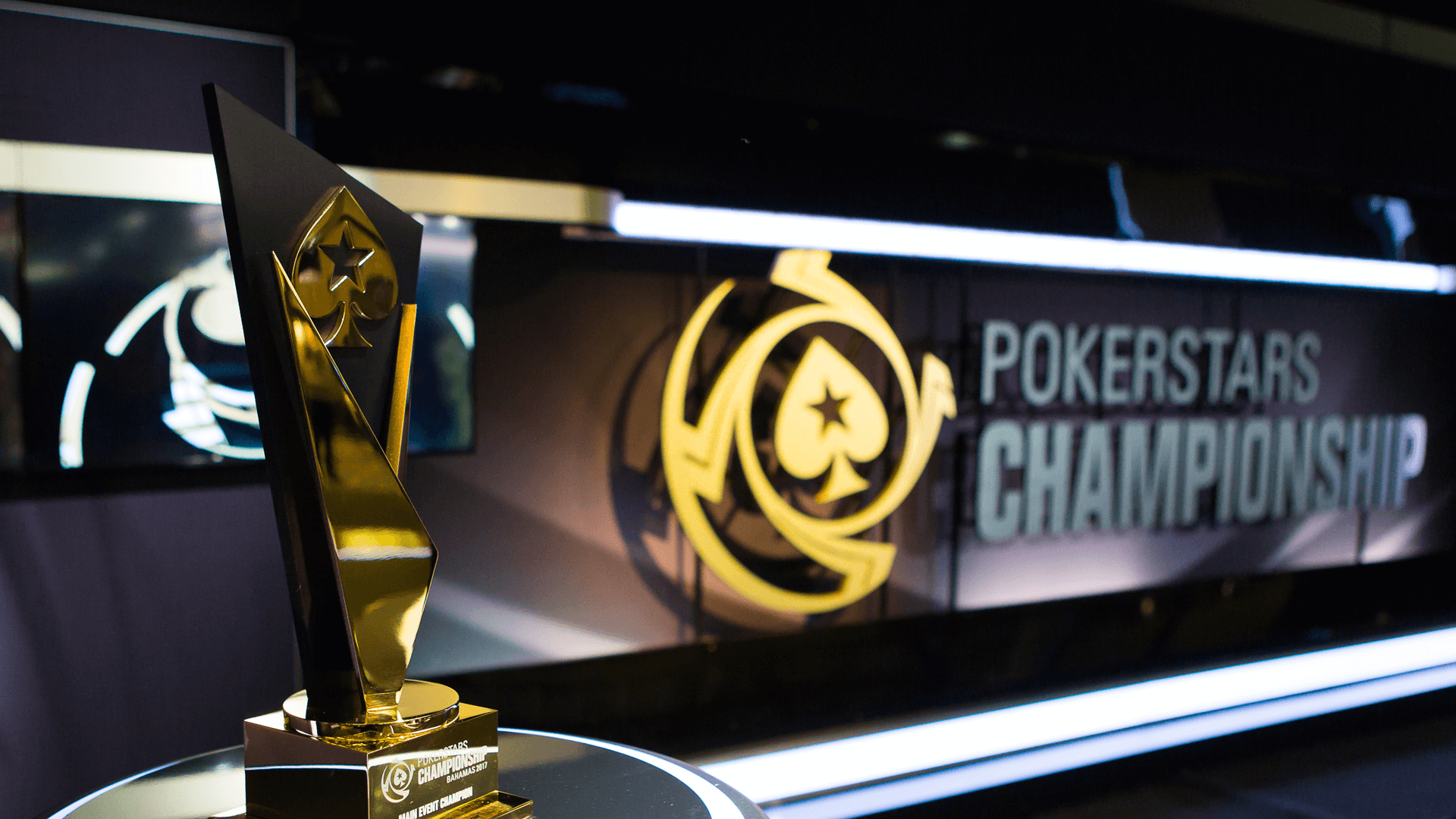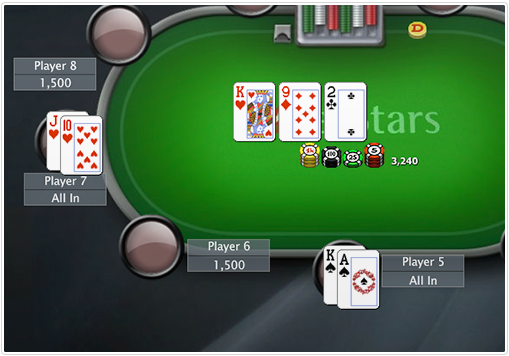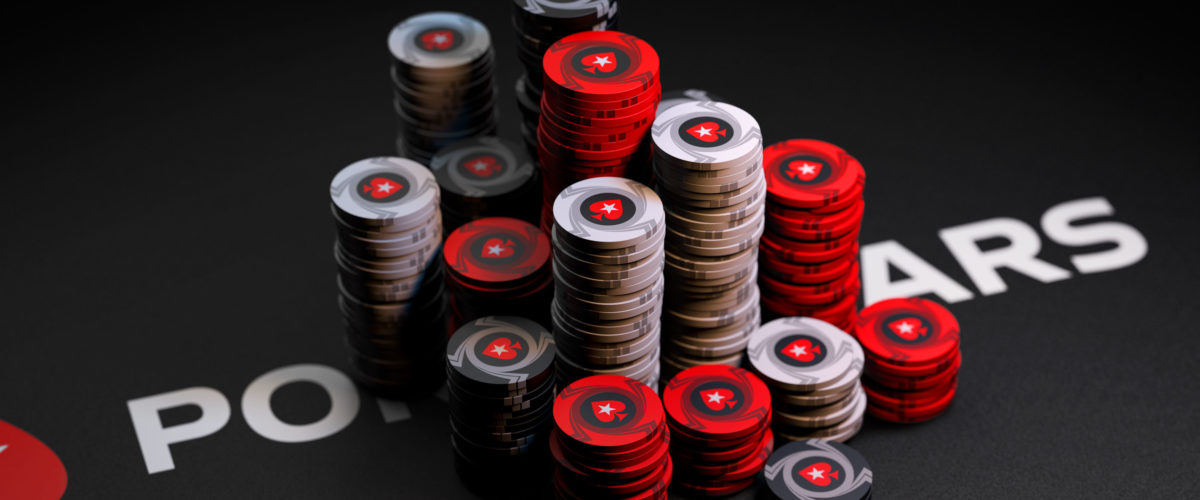Tight Aggressive Style
Although there are numerous styles of play, and various players adapt their games to suit specific circumstances and opponents, one basic, successful Texas Hold’em strategy is to play tight-aggressive poker.
The PokerStars School courses tend to focus on tight-aggressive play as it is the best for a beginner to adopt.
“Tight” means playing strong hands and folding weak ones. Meanwhile an “aggressive” player will bet and raise, and only rarely call. Somebody who plays tight and aggressive waits for profitable situations and consistently takes advantage of them.

As always in poker, there are many situations that demand slight deviations from the rules. But learn how to grasp the basics first and then take it from there.
Keep It Tight
There are 169 different starting hands in Texas Hold’em, but most of the profit comes from only a few of them.
Sometimes you will be dealt premium hands – pocket aces and the like – but more often you will get weak hands such as 10♠ 5♠ , or trash hands like 7♠ 2♦ . If you have a weak starting hand and your opponent has a strong one, you are at a significant disadvantage right from the start.
Even professional poker players aren’t able to make a long-term profit in these situations. It is therefore important to fold before the flop if you don’t have a strong starting hand.
This playing style is called “tight”, as you are very selective and only play hands where you think you have an advantage. At a table with nine players you should only play 15 to 20 per cent of the hands you are dealt, on average. This means you should fold before the flop in four out of five cases.
Some opponents won’t stick to this recommendation and play almost every hand, which is a style of play known as “loose”.
Stay aggressive
Aggression is good in poker. It describes a style that involves frequent bets and raises, and calling rarely, in order to influence the game in your favour. Almost all successful poker professionals play aggressively. It’s very important to bet consistently when you have the best hand so that the maximum amount of money goes into the pot.
You want your opponent to be calling if you have a hand that is favourite to win.
It is also profitable if all your opponents fold their cards, giving you the pot without having to show your hand. This is only possible if you are betting and raising a lot.
If you play passively (ie, the opposite of aggressively), then the pot stays small and you offer your opponent the chance of improving their hand.
They can check to see more cards, or to take the hand to showdown where you will be forced to show what you are holding.
EXAMPLE:

In the hand pictured, you are Player 5 holding A♠ K♠ , and your opponent Player 7 has J♥ 10♥ .
The flop comes K♥ 9♦ 2♣ and $10 is already in the pot.
You have top pair and therefore the best hand. Your opponent has a weak hand, but would make a straight if a queen hits on the turn.
Compare these three possible outcomes:
- If you bet $5 and our opponent folds you are certain to win $10.
- If you bet $5 and your opponent calls, the pot becomes bigger. You will probably win, so this is even better than forcing your opponent to fold.
- If you don’t bet, your opponent will probably check as well. This means they get a chance to hit a queen without having to invest any money.
It is clearly better to bet, regardless of whether your opponent calls. Checking would be a mistake.
In some instances, some players decline the option to bet if they have a good hand, because they don’t want their opponents to fold. This is called “slow play”. However, slow playing is often a mistake; it is almost always better to force your opponent to fold than to give them a chance to win the hand without having to invest money.
If you have a very weak hand and you bet hoping that all your opponents will fold, you are bluffing. The option of bluffing makes poker a very exciting game. However, beginners should be careful and bluff sparingly. In most cases you should simply fold weak hands and instead wait for good hands and bet them aggressively.
Gathering and Using Information
Poker would be no fun if everyone’s cards were always face up. This would mean people would always bet when they were ahead and fold when they were losing. Everyone would play perfectly and only the deal of the cards would decide the winner.
In reality, you cannot see your opponents’ hole cards and therefore the game is much more difficult and much more interesting. But a good player should always be trying to make an educated guess about their opponents’ hands. Although you can never be 100 per cent sure what they are holding, you can gather information by the way they act.
The more information you have, the better you can play.

As a very general rule, if an opponent bets or raises, he is telling you that his hand is strong. Similarly if he only calls, his hole cards can’t be that bad and perhaps he is hoping to improve his hand by seeing the flop, turn or river. If he folds you don’t have to worry about him; he has told you his cards were bad.
If you have good position at the table, ideally on the button, you are last to act and so have the best chance to observe your opponents. Don’t squander it. Pay close attention and listen to what your opponents are telling you through their decision-making.
EXAMPLE: You are on the button holding A♠ 10♥ . This is a decent, but not excellent, starting hand. In this favorable position you can observe what the players in front of you do and adjust your game accordingly.
Consider these two possible scenarios:
- All of your opponents fold. This means there are only two players still active in the hand (the two blinds). You probably have the best hand and should therefore raise.
- A player in early position raises and all other opponents fold. You are probably behind, as usually a player in early position will only raise if he has a very strong hand. Your chance of winning against such a strong starting hand is very small and you should therefore fold.
In this case, the additional information you received lets you make the best decision. If you were in early position you would not have had as much information to help you. Similar scenarios also happen after the flop. This is why you can play more hands and make more profit when in position.
Conclusion
Poker novices typically want to play too many hands and play them weakly. They check or call rather than bet or raise. They play “loose-passive” instead of “tight-aggressive”.
They play from early position, when minimal information is available, instead of waiting until later when they can act on what their opponents are telling them. Sometimes they compound this error by not paying attention and not making the most of their positional advantage.
In practice it is not always possible to play tight-aggressive, but it is the best style for a novice player to get started.

